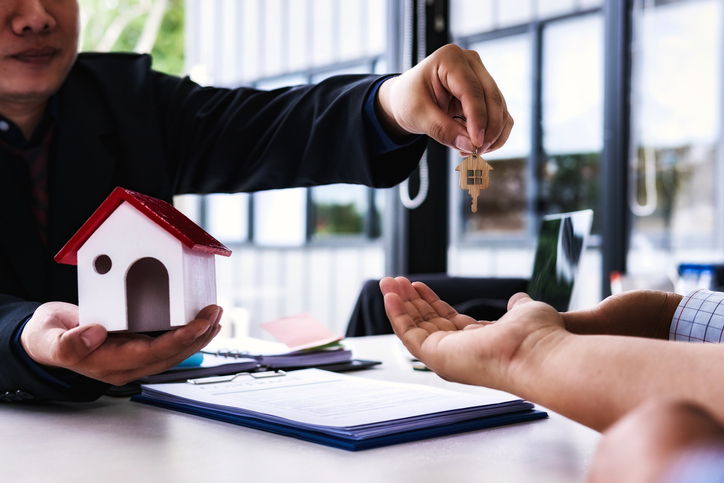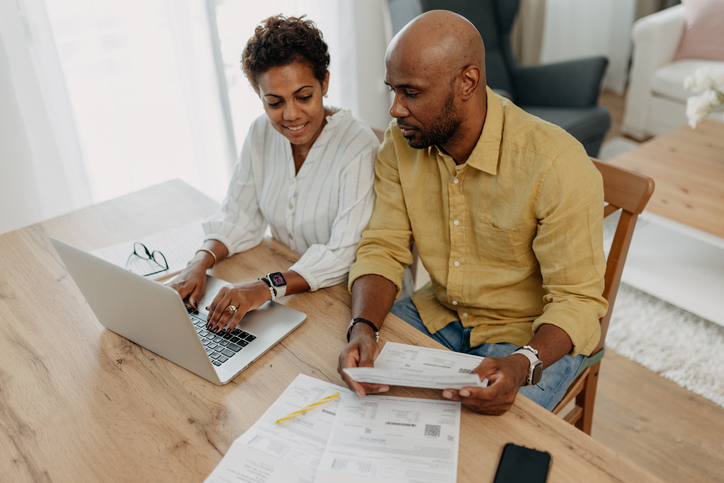How Much Income Do You Need to Buy a $300,000 House?
SmartAsset maintains strict editorial integrity. It doesn’t provide legal, tax, accounting or financial advice and isn’t a financial planner, broker, lawyer or tax adviser. Consult with your own advisers for guidance. Opinions, analyses, reviews or recommendations expressed in this post are only the author’s and for informational purposes. This post may contain links from advertisers, and we may receive compensation for marketing their products or services or if users purchase products or services. | Marketing Disclosure
Buying a home is one of the biggest financial decisions you can make. But figuring out how much income you need can feel overwhelming. A $300,000 house may sound straightforward, but the true cost depends on several factors. Your down payment, interest rate, and even where you live can impact the cost. You should know how lenders calculate affordability and what expenses to expect before making a decision. It can help you set a clear budget and move forward with confidence.
How to Calculate How Much House You Can Afford
The foundation of affordability is your household income. Lenders generally follow the “28/36 rule.” This means a max of 28% of your gross monthly income is for housing, and 36% total covers your debts. This includes your mortgage, car loans, and credit cards. If you’re eyeing a $300,000 house, this rule helps you back into the salary range you’ll likely need to qualify.
The size of your down payment can significantly change the income required. A larger down payment reduces the loan amount, which lowers both monthly mortgage payments and the long-term interest you’ll pay. For example, putting down 20% on a $300,000 house reduces your mortgage to $240,000, while a smaller 5% down payment means borrowing $285,000. That difference can raise or lower your monthly budget by hundreds of dollars.
You can’t ignore mortgage rates because they directly affect affordability. Even a one-percentage-point difference in interest rates can shift your monthly payment by a substantial amount. This means that someone who qualified comfortably at a 6% rate may find themselves stretching at 7%. Watching rates and locking in a favorable one is a key part of calculating what you can afford.
Beyond the mortgage itself, property taxes and homeowners insurance add to your monthly housing costs. These expenses vary widely by location and property type, so it’s important to research local averages. Neglecting these can leave you underestimating your true monthly payment, and its crucial to understand how much house you can afford.
How Much You Need to Buy a $300,000 House (By Down Payment)

Putting 20% down is the traditional benchmark for homebuyers. On a $300,000 house, that equals $60,000. This approach reduces your loan balance to $240,000, which lowers monthly payments and eliminates the need for private mortgage insurance (PMI). While it’s a hefty sum to save, it offers long-term savings through smaller payments and less interest over the life of the loan.
A 10% down payment equals $30,000, cutting your mortgage to $270,000. Monthly payments will be higher compared with the 20% scenario, and you’ll likely pay PMI until your equity reaches 20%. Still, for many buyers, this option strikes a balance between affordability and flexibility, allowing you to enter the housing market sooner.
At just 5% down, you’d need $15,000 upfront. Your loan would total $285,000, and PMI would be required, adding to your monthly costs. While this path makes homeownership more accessible, especially for first-time buyers, it does increase both the risk of payment strain and the long-term cost of the loan. Buyers choosing this route should be especially careful with budgeting.
Some conventional and first-time homebuyer programs allow as little as 3% down. On a $300,000 house, that’s just $9,000 upfront, leaving a mortgage of $291,000. This is the most accessible option for those with limited savings, but it comes with the highest monthly payments and ongoing PMI. It can be a stepping stone into homeownership, but it’s important to weigh the trade-offs before committing.
It’s easy to focus solely on the down payment, but buyers should also budget for closing costs, which typically run 2% to 5% of the purchase price. On a $300,000 home, that’s another $6,000 to $15,000. Having cash reserves for these expenses—and an emergency fund—ensures you’re financially prepared beyond just meeting the minimum required to buy the house.
Factors That Might Impact How Much You Need to Buy a House
When you’re planning to buy a home, the actual amount you’ll need can shift based on several factors. Understanding these variables will help you set a more realistic budget and avoid surprises during the homebuying process.
- Credit Score: Your credit score influences the interest rate you’re offered, which in turn affects your monthly payments. A higher score often means lower borrowing costs, while a weaker score can make your loan more expensive over time.
- Debt-to-Income Ratio (DTI): Lenders look at your existing debts compared with your income to assess risk. If your debt-to-income ratio is high, you may need a larger down payment or stronger income to qualify.
- Location and Property Taxes: The cost of living and property taxes vary significantly depending on where you buy. A $300,000 home in one state may come with much higher annual taxes than the same-priced home elsewhere, increasing your overall costs.
- Loan Type: The type of mortgage you choose (conventional, FHA, VA or USDA) affects how much you need upfront. Some programs allow for lower down payments but may require mortgage insurance or come with stricter qualification standards.
- Closing Costs: Buyers should plan for 2% to 5% of the purchase price in closing costs, which include fees for appraisals, title searches, and loan origination. These expenses can easily add thousands to your upfront budget.
- Homeowners Insurance and HOA Fees: Insurance premiums and, in some neighborhoods, homeowners association (HOA) dues can increase your monthly payment. Factoring these in helps you avoid stretching your budget too thin.
Ultimately, the total cost of buying a home is shaped by more than just the sticker price. By accounting for these factors in advance, you’ll be better positioned to determine how much house you can truly afford and plan your purchase with confidence.
Bottom Line

Buying a $300,000 house requires more than just looking at the listing price, it’s about understanding how income, down payment, loan terms, and other costs fit into your financial picture. From saving for a down payment to budgeting for taxes, insurance and closing costs, each factor shapes how much you’ll really need. By running the numbers carefully and considering your long-term goals, you can approach homeownership with confidence and avoid stretching your finances too thin. For personalized guidance, speaking with a financial advisor can help you align your home buying plans with your overall financial strategy.
Tips for Financial Planning
- A financial advisor can help you plan out your finances so that you’re ready for the big moments of life, such as buying a house at the right time. Finding a financial advisor doesn’t have to be hard. SmartAsset’s free tool matches you with vetted financial advisors who serve your area, and you can have a free introductory call with your advisor matches to decide which one you feel is right for you. If you’re ready to find an advisor who can help you achieve your financial goals, get started now.
- Getting ready to buy a house but what to estimate what you’ll pay? Consider using a mortgage calculator to determine what your options are other things such as how much PMI you might have to end up paying.
Photo credit: ©iStock.com/ArLawKa AungTun, ©iStock.com/Yok_Piyapong, ©iStock.com/ArLawKa AungTun
Was this content helpful? Yes No
Are Your HOA Fees Tax-Deductible?
Edited by Arturo Conde, CEPF®
Published on February 25, 2025, 12:35pm ET
|Fact Checked
SmartAsset maintains strict editorial integrity. It doesn’t provide legal, tax, accounting or financial advice and isn’t a financial planner, broker, lawyer or tax adviser. Consult with your own advisers for guidance. Opinions, analyses, reviews or recommendations expressed in this post are only the author’s and for informational purposes. This post may contain links from advertisers, and we may receive compensation for marketing their products or services or if users purchase products or services. | Marketing Disclosure
Homeowners association (HOA) fees are a common expense for those living in condominiums, townhouses and planned communities that need to maintain shared amenities. However, when tax season arrives, many homeowners wonder if their homeowner’s association fees are tax deductible. The short answer, for most homeowners, is that HOA fees are not tax-deductible. However, homeowners who rent properties or conduct business from home may qualify for certain deductions.
A financial advisor can help you determine what qualifies for deductions and how to maximize your tax savings.
https://smartasset.com/embed/depositrates?key=khg8zmxdjoohfsoso1kbeeateumkatwo&src=https%3A%2F%2Fsmartasset.com%2Fmortgage%2Fare-homeowners-association-fees-tax-deductible&ver=1.1
Are HOA Fees Tax-Deductible?
For most homeowners, HOA fees are considered personal expenses, meaning that they are not deductible on a federal tax return. The IRS does not typically allow deductions for maintenance or association fees related to a primary residence. However, there are some exceptions.
HOA Fees for Rental Properties
If a property is used as a rental, HOA fees may be deductible as part of the cost of maintaining the rental. Since rental income is taxable, the IRS offers several rental property tax deductions including HOA fees.
- To qualify, the property must be rented out for a portion of the year, and the fees must be directly related to maintaining the rental.
- If the property is only rented for part of the year and used personally for the rest, homeowners can only deduct a portion of the HOA fees based on the percentage of time the property is rented.
- These deductions can be claimed on Schedule E of the tax return, which is used for reporting rental income and expenses.
HOA Fees for a Home Office
Homeowners who use part of their residence exclusively for business purposes may be able to deduct a portion of their HOA fees under the home office tax deduction. This applies to self-employed individuals or business owners who operate a business from their home.
- To qualify, the home office must be used regularly and exclusively for conducting business.
- The percentage of the home used for business determines the portion of HOA fees that can be deducted. For example, if a home office occupies 10% of a residence, then 10% of the HOA fees may be deducted.
- This deduction is reported on Form 8829, which calculates the expenses for business use of a home.
HOA Fees for Property Investment
Investors who purchase properties in HOA-managed communities as part of their investment portfolio may also qualify for deductions. If the property is used as an investment rather than a primary residence, expenses related to maintaining the property, including HOA fees, may be deductible.
- This applies to real estate investors who hold properties for income generation, whether through short-term rentals or long-term leasing.
- In this case, HOA fees are classified as operating expenses, similar to property management fees.
- Real estate professionals who actively manage their rental properties may also be eligible for additional tax deductions beyond HOA fees.
Home Expenses That Are Tax Deductible
While HOA fees are generally not deductible for most homeowners, there are several other home-related expenses that may qualify for tax deductions. These deductions can help homeowners reduce their taxable income and save money on their tax bill.
- Mortgage interest. Homeowners who itemize their deductions can deduct interest paid on a mortgage loan. The deduction applies to interest paid on loans up to $750,000 for single filers and married couples filing jointly. For homeowners who purchased their property before December 15, 2017, the deduction limit is $1 million.
- Property taxes. State and local property taxes are deductible under the State and Local Tax (SALT) deduction. However, this deduction is capped at $10,000 for single filers and married couples filing jointly or $5,000 for married individuals filing separately.
- Home equity loan or HELOC interest. Interest paid on a home equity loan or home equity line of credit is deductible if the loan was used to buy, build or improve the home. If the loan is used for personal expenses, such as paying off credit card debt, the interest is not deductible.
- Home Office Expenses. Homeowners who use part of their home exclusively for business purposes may be eligible for the home office deduction. This deduction can cover a portion of rent or mortgage interest, utilities and maintenance expenses. Employees working remotely do not qualify for this deduction.
Bottom Line

In most cases, homeowner’s association fees are not tax deductible. However, for rental properties, home offices or real estate investments, these fees may qualify as deductions. While there are limitations, homeowners may still take advantage of other home-related tax deductions, including mortgage interest, property taxes and energy-efficient home improvements. Working with a tax consultant can provide additional insights into the deductions available to you.
Tips for Homebuyers
- A financial advisor can help you create a financial plan for your homeownership goals that also accounts for taxes. Finding a financial advisor doesn’t have to be hard. SmartAsset’s free tool matches you with vetted financial advisors who serve your area, and you can have a free introductory call with your advisor matches to decide which one you feel is right for you. If you’re ready to find an advisor who can help you achieve your financial goals, get started now.
- If you want to figure out how much you can spend on a home, SmartAsset’s affordability calculator can help you estimate how much house you can afford based on several key inputs.
Photo credit: ©iStock.com/supersizer, ©iStock.com/sanjeriWas this content helpful? Yes No



